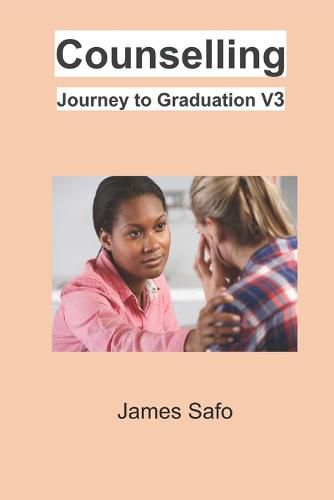Readings Newsletter
Become a Readings Member to make your shopping experience even easier.
Sign in or sign up for free!
You’re not far away from qualifying for FREE standard shipping within Australia
You’ve qualified for FREE standard shipping within Australia
The cart is loading…






Counselling is short-term, dealing with present issues and involving a helping approach that "highlights the emotional and intellectual experience of a client," including how they feel and think about a problem or concern (Krishnan, n.d., p 5) sometimes emotions, as well as feelings, become overwhelming, and people lose their confidence. Counselling helps an individual overcome their problems and to gain their lost confidence. Counselling and psychotherapy can be used to treat a wide range of mental health conditions, including depression, anxiety disorders, borderline personality disorder (BPD), obsessive-compulsive disorder (OCD), post-traumatic stress disorder (PTSD), long-term illnesses, eating disorders, such as anorexia nervosa, bulimia and binge eating disorder, drug misuse emotional problems, including stress, bereavement, divorce, redundancy, or relationship problems. Types of counselling and psychotherapy; Several different treatments are available. psychodynamic (psychoanalytic) psychotherapy cognitive behavioural therapy (CBT) cognitive analytical therapy (CAT) humanistic therapies interpersonal psychotherapy (IPT) family and couple (systemic) therapy Therapists are trained to listen to a person's problems to find out what's causing them and help them find a solution by changing individual attitudes and behaviour. Counselling as a profession involves: Dedicated time set aside to explore difficulties, stressful situations, or emotional upset faced by a client Helping that client see their status and feelings from a different viewpoint, potentially facilitating change Building a relationship based on trust and confidentiality The most common types of counselling include; Marriage and Family, educational Counselling, Rehabilitation, Mental Health, and Substance Abuse. Marriage and Family Counselling Problems often result in constant fights with their partners or family members. Marriage and family counselling come in here. Counselling helps them overcome their problems. Educational Counselling A fresh-out-of-school or college student often needs guidance about which career to choose. Educational counselling helps these people in choosing their career path. Mental Health Counselling Mental illnesses have become very common these days. Mental health counselling helps people to be aware of identifying their symptoms and dealing with issues that impact their mental health and well-being. Some mental illnesses are depression, PTSD, ADHD, Bipolar disorder, and more. This counselling focuses on these issues and helps resolve them for a healthier life. Substance Abuse Counselling Substance abuse counselling is a form of counselling which helps people by treating them and supporting them in breaking free from their drug and alcohol addiction. The counsellor thereby suggests coping strategies which make a positive impact on their lives. Moreover, they also provide them with practising skills and behaviours that help their recovery. Rehabilitation Counselling This type of counselling refers to a practice where the counsellor helps people with emotional and physical disabilities.
$9.00 standard shipping within Australia
FREE standard shipping within Australia for orders over $100.00
Express & International shipping calculated at checkout
Counselling is short-term, dealing with present issues and involving a helping approach that "highlights the emotional and intellectual experience of a client," including how they feel and think about a problem or concern (Krishnan, n.d., p 5) sometimes emotions, as well as feelings, become overwhelming, and people lose their confidence. Counselling helps an individual overcome their problems and to gain their lost confidence. Counselling and psychotherapy can be used to treat a wide range of mental health conditions, including depression, anxiety disorders, borderline personality disorder (BPD), obsessive-compulsive disorder (OCD), post-traumatic stress disorder (PTSD), long-term illnesses, eating disorders, such as anorexia nervosa, bulimia and binge eating disorder, drug misuse emotional problems, including stress, bereavement, divorce, redundancy, or relationship problems. Types of counselling and psychotherapy; Several different treatments are available. psychodynamic (psychoanalytic) psychotherapy cognitive behavioural therapy (CBT) cognitive analytical therapy (CAT) humanistic therapies interpersonal psychotherapy (IPT) family and couple (systemic) therapy Therapists are trained to listen to a person's problems to find out what's causing them and help them find a solution by changing individual attitudes and behaviour. Counselling as a profession involves: Dedicated time set aside to explore difficulties, stressful situations, or emotional upset faced by a client Helping that client see their status and feelings from a different viewpoint, potentially facilitating change Building a relationship based on trust and confidentiality The most common types of counselling include; Marriage and Family, educational Counselling, Rehabilitation, Mental Health, and Substance Abuse. Marriage and Family Counselling Problems often result in constant fights with their partners or family members. Marriage and family counselling come in here. Counselling helps them overcome their problems. Educational Counselling A fresh-out-of-school or college student often needs guidance about which career to choose. Educational counselling helps these people in choosing their career path. Mental Health Counselling Mental illnesses have become very common these days. Mental health counselling helps people to be aware of identifying their symptoms and dealing with issues that impact their mental health and well-being. Some mental illnesses are depression, PTSD, ADHD, Bipolar disorder, and more. This counselling focuses on these issues and helps resolve them for a healthier life. Substance Abuse Counselling Substance abuse counselling is a form of counselling which helps people by treating them and supporting them in breaking free from their drug and alcohol addiction. The counsellor thereby suggests coping strategies which make a positive impact on their lives. Moreover, they also provide them with practising skills and behaviours that help their recovery. Rehabilitation Counselling This type of counselling refers to a practice where the counsellor helps people with emotional and physical disabilities.